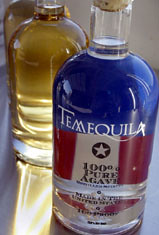
Story by : David Agren
J.B. Wagoner initially wanted to beautify his Southern California property with a low-maintenance plant, ideal for the region's dry climate and steep terrain. So he planted 25 acres of blue agave, the source of tequila, Mexico's famed firewater.
"It just seemed like the reasonable thing to do," he explains. "It was a plant that I didn't have to water; it would grow on my hills."
Planting blue agaves -- and later entering the "agave spirits business" -- also launched him on a collision course with tequila producers and their influential regulator.
Wagoner recently distilled his first batches of a tequila-like drink from his agave harvest, putting the 100-proof liquor in red, white and blue bottles with "Made in the U.S.A." labels. He'll produce approximately 120,000 liters in his first year of operations -- an amount he calls, "A drop in the bucket," when compared with the vast amounts bottled by tequila giants like Jose Cuervo and Sauza. He also named his beverage "Temequila," a word play on Temecula, the Riverside County suburb where he cultivates blue agave.
"It seemed to be a logical name," he explains with a laugh.
His joke fell flat in Western Mexico's agave growing regions though, where the prospect of Gringo tequila unsettles many regulatory officials, producers and connoisseurs, who consider the iconic drink a national treasure. The Guadalajara-based Consejo Regulador del Tequila (CRT), which protects tequila's appellation of origin status, took issue with Wagoner using a similar sounding name.
"(The name) could deceive consumers, regarding the nature of the product," says Bertha Becerra, a spokeswoman for the CRT.
But non-Mexican agave beverages are creeping into the market, capitalizing on tequila's recent surge in popularity and its growing acceptance as a premium drink. Along with Skyrocket Distiller's product, now called J.B. Wagoner's Ultra Premium 100% Blue Agave Spirits, a South African firm began bottling "Spirit of Agave," which it markets as an alternative to higher-priced Mexican offerings.
Tequila is an immense source of pride in Mexico, especially in Jalisco, where residents from all social classes toast successes and drown sorrows with a shot of the locally-distilled drink. The Jalisco state government even adorns its license plates with an image of blue agave, which grows abundantly in its dry highlands.
The region's red soil and geographic setting give blue agave its unique qualities, according to the CRT, making the tequila they certify the real deal.
"In the first place, the location is everything," Becerra explains. "It's the soil conditions, it's the terrain, it's the climate, it's the altitude, it's the maturation period, it's the amount of rain, it's the whole cycle."
By law, all tequila must originate in either Jalisco or designated regions of Guanajuato, Michoacan, Nayarit or Tamaulipus states. Mexico first obtained an appellation of origin designation in 1974 for mezcal beverages from the region surrounding Tequila, a pueblo 50 kilometers west of Guadalajara. The rules are so strict, distillers in Mexican states surrounding the designated regions ceased operations after the appellation of origin laws were passed.
The designation is similar to those given to Cognac, a type of brandy from the French region of the same name, and to Champagne.
The CRT jealously guards its rights to the tequila name and even cracks down on distillers using brands it deems might damage the beverage's image or reputation. Several years back, it banished Tequila Cabron (loosely translated: Bastard Tequila). Earlier this year, disgruntled competitors and a local politician maligned Tequila Asombroso for supposedly using a phallic-shaped decanter. Now Mexican officials have Temequila and Spirit of Agave in their sights.
"They took advantage of tequila's worldwide image to promote their products," Becerra says.
Wagoner shrugs off the controversy, "I'm clearing stating, 'This is not a product of Mexico.'
"I've got a red, white and blue bottle. I don't want people to be confused by this at all."
Furthermore, he clarifies one thing almost immediately about his new line of work: "I'm not in the Tequila business ... I'm in the agave spirits business."
Despite Mexico's love of tequila, Americans drink more than half of all production. Tequila sales grew by more than five percent in 2004, making it the fastest growing product in the hard liquor category, according to the Distilled Spirits Council of the United States.
Taking advantage of tequila's popularity, Wagoner has found plenty of buyers for his agave beverage, quickly selling out his initial batches, which he markets as a premium product. A 750-ml bottle sells for 58 dollars. A quick scan of his customer list reveals many Latino names. He also employs many Mexican immigrants in his business.
"We probably have the highest-paid jimadores (agave harvesters) in the industry," he says.
With the tequila's popularity growing, water shortages in Southern California becoming more acute and markets for the avocado and citrus farmers in the region shrinking, Wagoner sees more agave spirits coming to liquor store shelves.
"I think the market is big enough to allow for [non-Mexican] competition"
Published in the Ottawa Citizen.


2 comments:
Who you calling Gringo? http://temequila.com
Yeah, at the end of the day the comment is professionally pejorative. Just like Gabacho or even guero. Although I get the point of the use of the term for the article's sake I think it's lost on many Mexicans that these terms are not favorable despite the continued perception of US economic dominance over Mexico
I can't a imagine a US writer using the term, Beaner software entrepreneur irking American businessmen
Post a Comment